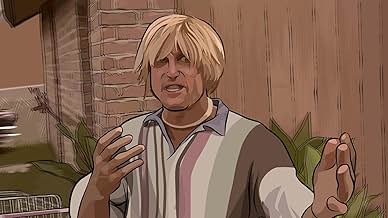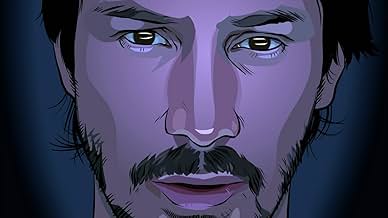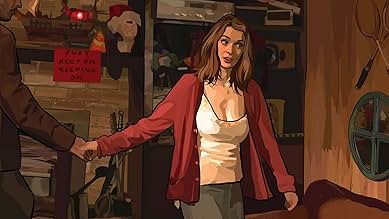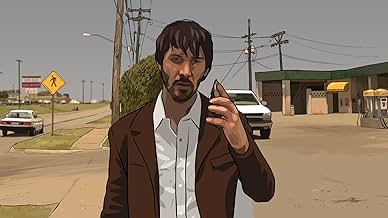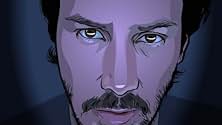Un poliziotto sotto copertura in un futuro non troppo lontano viene coinvolto in un nuovo pericoloso caso di droga e comincia a perdere la propria identità.Un poliziotto sotto copertura in un futuro non troppo lontano viene coinvolto in un nuovo pericoloso caso di droga e comincia a perdere la propria identità.Un poliziotto sotto copertura in un futuro non troppo lontano viene coinvolto in un nuovo pericoloso caso di droga e comincia a perdere la propria identità.
- Regia
- Sceneggiatura
- Star
- Premi
- 4 vittorie e 21 candidature totali
- Waitress
- (as Natasha Valdez)
Recensioni in evidenza
Enter "A Scanner Darkly", aside from the Interpolative Rotoscoping that the film maker used to put the graphical images of this movie together and give it an amazing visual feel all its own, the vision and imagery conveyed by the film are as true to Dick's original as any movie has come. I left the theater feeling overwhelmed, touched, and changed, much the same way as when I'd finished the book. This is rare, and it is decidedly a beautiful thing.
For those who haven't read the book, it's important to know what you're getting into. PK Dick wrote this novel as a way of telling the story of how he and his friends in the early '70s damaged and destroyed themselves with drugs. He tells this story within the framework of a surreal science fiction thriller, but many of the scenes are straight from his own experiences with the unpleasant consequences of people using drugs and disintegrating mentally.
This film does an amazing job of capturing the feel and tone of the book as well as the paranoia, perceptual distortions, and chaos of hallucinogenic overindulgence. Add to that a story that only gradually emerges from the madness, but by the end brings in a lot of heavy ideas such as the existence of free will, whether ends justify means, etc. There is a sense of consequence to what happens in the film, a sense of despair at what has been lost. So this story of drug-addled losers becomes the story of the human struggle for identity and meaning.
I have a couple of minor quibbles regarding scenes from the book that only partially made the cut (no explanation for the significance of "If I'd known it was harmless I would have killed it myself, no little kid to explain how 6 and 3 gears means 18 speeds). Still, most adaptations of PK Dick stories take a few basic ideas and try to shape them into more conventional films that fit into established genres. Even when it works, such as with Blade Runner or Total Recall, it's not really PK Dick. Not so this film. This is PK in all his dark and perverse and deeply thoughtful glory.
I had reasonably high hopes for this film but also the fear I have when anyone takes on material that some have called "unfilmable". Written at a time when his marriage had broken down and he himself was struggling with his drug use and split identities, Dick's material does offer much of interest as long as it can be delivered in such a way to be engaging and interesting. "Making sense" was not one of the qualities I really needed, which was just as well since narratively there isn't a lot to follow along with. Parts of it are funny, parts of it are trippy and parts of it are dramatic. However none of them really come together to produce anything of that much value. It is a shame that the ideas over identity, drugs and the morals of the war on drugs are not better played out. As it is I didn't think there was enough of interest and, with the narrative being so basic, what remained was surprisingly dull.
The use of the rotoscoping was a smart move and also serves as an interesting hook for multiplex audience (and I include myself therein, so it is not a snobbish reference) that have perhaps not seen it before. Linklater produces some good effects this way and it is hard to think of another approach working as well within the context of the material as it does. Sadly this is not enough to carry the film along, although it will be enough to satisfy some sections of the audience. The cast do the best they can within this unsuccessful mix and most of them are individually good here and there. Reeves is a natural stoner but he doesn't convince with his breakdown and confusion that well; he isn't helped by the lack of focus in the script but he can't lift it regardless. Downey Jr is very funny and convincing and wards off the boredom when he is near. Harrelson tries to follow suit but with a dumber character he just falls flat. Cochrane is more enjoyable and the animation really aids his performance. Ryder is OK but she has too much of the narrative to carry and she cannot do it.
Overall this is an OK film at best. It is sporadically interesting, funny and engaging however it cannot find any consistency of tone, pace or engagement. The material is good enough to throw up interesting ideas and themes but Linklater sadly doesn't manage to do much with them across the film. The use of animation over the film cells is really well crafted and works well to support the material it is just a shame then that the awareness and control that Linklater in this area he seems to lack in others.
In this prescient tale set in the "near future," Keanu Reeves plays the undercover cop, Agent Fred, who, under the pseudonym Bob Arctor, is sent to live in a home with several known drug addicts: Barris, played by Robert Downey Jr. and Luckman, played by Woody Harrelson. When Fred begins taking the newly fabricated drug known as "Substance D," which causes the two hemispheres of the brain to disconnect and go to war with one another, Fred/Arctor becomes essentially two distinctly separate persons, so that, in his capacity as an undercover agent, he is actually spying on himself without realizing it. Winona Ryder appears as Donna, the beautiful but sexually frigid coke addict who becomes Arctor's girlfriend.
"A Scanner Darkly" is an easy film for a viewer to get lost in, so it pays to know a little something about the story before heading into it. As a screenwriter, Linklater captures the woozy insubstantiality of the drug experience well enough but often at the expense of narrative consistency and coherence, especially for the uninitiated. I'm afraid lots of people may become frustrated and confused near the beginning and simply tune out. That would be a real shame because the movie turns into a darkly fascinating rumination on the effect drug use has on the mind, while at the same time raising the ethical issue of just how far the government should go in "sacrificing" innocent victims to achieve a desired, perhaps even laudable, end. At times the movie may seem to be playing both sides of the drug-war fence, yet the sophistication and complexity of Dick's vision keeps it from becoming either an anti-government screed or an anti-drug diatribe.
Some of the dialogue comes off as corny and over earnest, but much of it is incisive and darkly humorous, with Barris and Larkman, in particular, hitting delicious comic heights in their paranoid/delusional ravings and interchanges.
Lo sapevi?
- QuizRobert Downey, Jr. wrote most of his lines down on post-it notes and scattered them around the set so he could read off them while filming a scene. The rotoscoping team simply animated over the notes to remove them from the film during post-production.
- BlooperWhile showing the monitoring equipment, Hank tells Fred that he could be anyone from Arctor's circle of friends, including Barris. This made sense in the book, however, by this time in the movie Hank has already seen Fred alongside Barris, so he could not possibly think they are the same person.
- Citazioni
Fred: [voiceover] What does a scanner see? Into the head? Down into the heart? Does it see into me? Into us? Clearly or darkly? I hope it sees clearly because I can't any longer see into myself. I see only murk. I hope for everyone's sake the scanners do better, because if the scanner sees only darkly the way I do, then I'm cursed and cursed again.
- Curiosità sui creditiThe "Phil" mentioned in the "in memoriam" list as having permanent pancreatic damage is Philip K. Dick himself.
- Colonne sonoreFog
Written by Thom Yorke (as Thomas Yorke), Phil Selway (as Philip Selway), Jonny Greenwood (as Jonathan Greenwood),
Colin Greenwood and Ed O'Brien (as Edward O'Brien)
Performed by Radiohead
Courtesy of Capitol Records
Under licence from EMI Film & Television Music
I più visti
Dettagli
- Data di uscita
- Paese di origine
- Sito ufficiale
- Lingua
- Celebre anche come
- Una mirada a la oscuridad
- Luoghi delle riprese
- Aziende produttrici
- Vedi altri crediti dell’azienda su IMDbPro
Botteghino
- Budget
- 8.700.000 USD (previsto)
- Lordo Stati Uniti e Canada
- 5.501.616 USD
- Fine settimana di apertura Stati Uniti e Canada
- 391.672 USD
- 9 lug 2006
- Lordo in tutto il mondo
- 7.660.857 USD
- Tempo di esecuzione1 ora 40 minuti
- Colore
- Mix di suoni
- Proporzioni
- 1.85 : 1
Contribuisci a questa pagina




